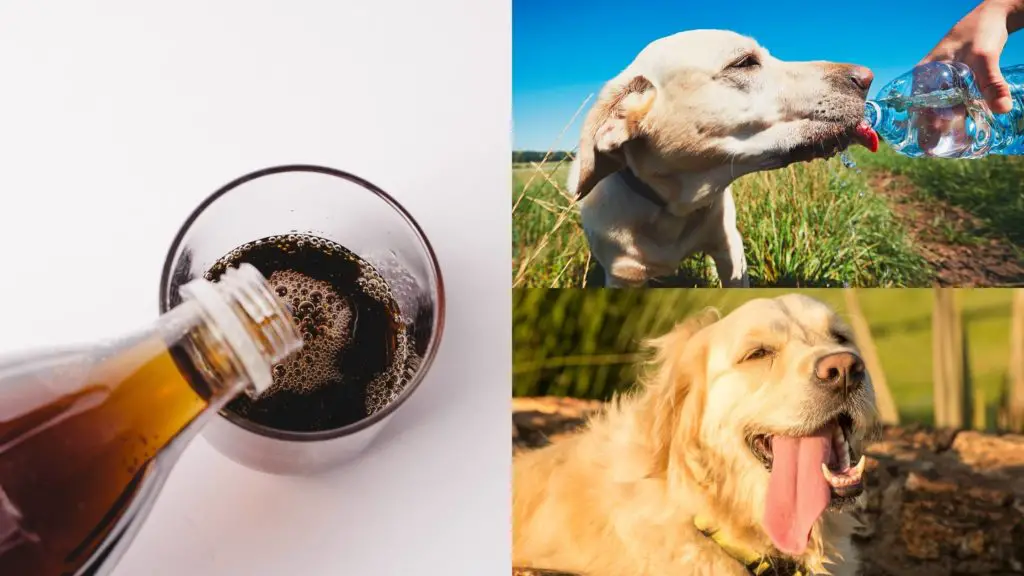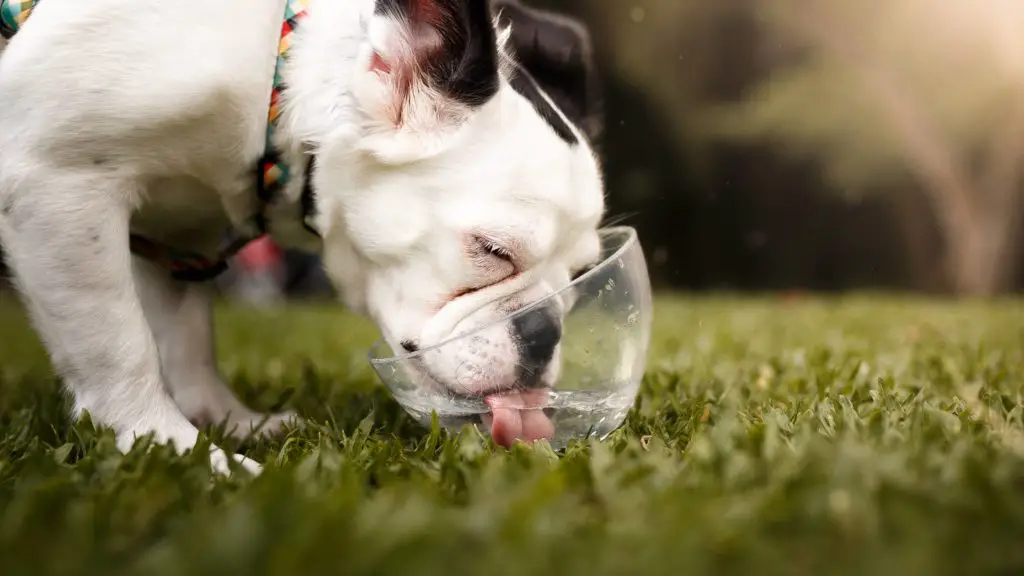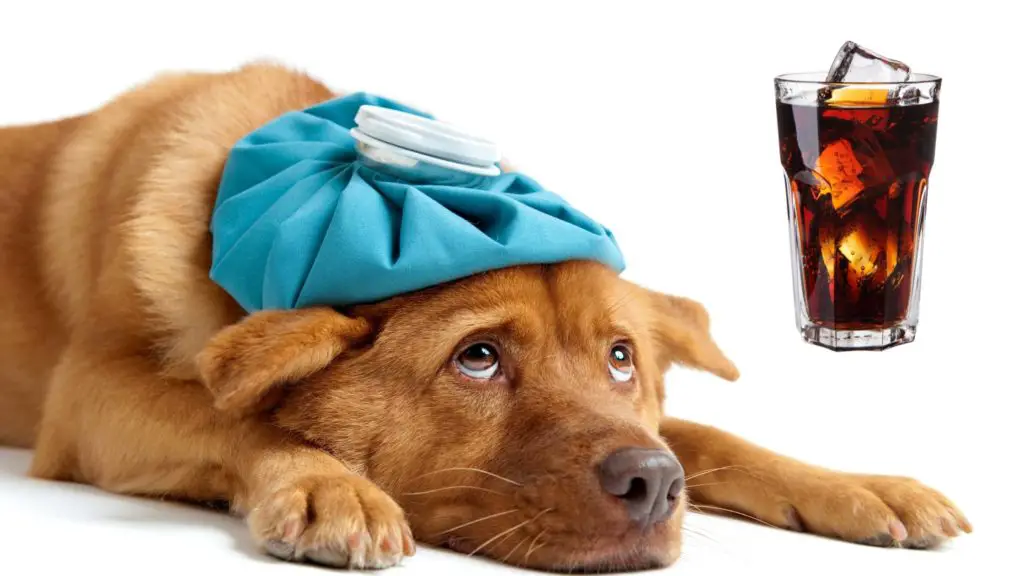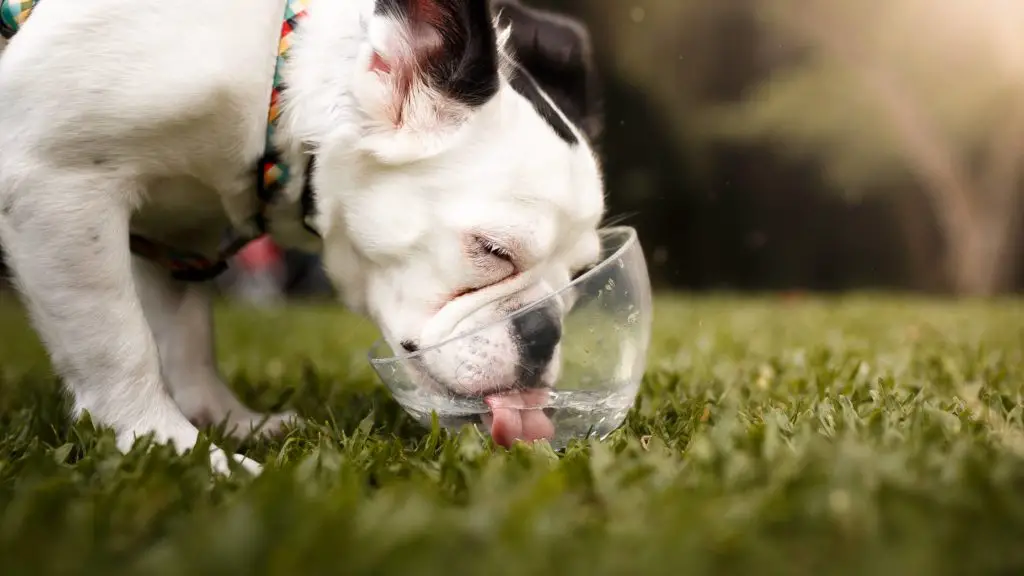Last Updated on 08/10/2021 by Veronica Jones
It is normal for you to feel curious about what your dog can and cannot have, especially when it comes to drinks. You likely know that water is the go-to drink for canines. However, you may wonder if dogs can have tasty and fizzy human drinks like cola.
So you might ask, “Can dogs drink soda?” Here is a comprehensive guide to help you learn all about the benefits, side effects, etc., of dogs drinking soda.
Can Dogs Drink Soda?
No, you should avoid giving a dog soda, including coke. Sodas are caffeinated and sweet drinks, meaning that it has a lot of sugar and caffeine. Your pooch can get very sick if they drink too much soda, and they will likely need to see a veterinarian right away.

What Happens if a Dog Drinks Soda?
If your dog accidentally consumes very small doses of soda, it may be fine. A tiny lick on a very rare occasion may not do anything to a healthy dog. However, you ought to avoid giving a dog soda on a regular basis as a treat because it is unhealthy for canines.
If your dog drinks too much soda, it can cause many health problems. How much soda is bad for a dog will depend on their size, but they should generally not have any soda.
Sodas contain a lot of artificial sweeteners, which can spike your dog’s blood sugar. Caffeine is a stimulant that does not work well for dogs and other mammals, and it can cause caffeine poisoning.

Are there Health Benefits to Giving a Dog Soda?
There are no real health benefits to a dog drinking soda. Most caffeinated and sugary drinks contain too many bad ingredients for dogs, making them a terrible choice for a dog’s drink.
While dogs can have plain carbonated water with no extra ingredients on occasion, fresh water should be the primary drink for your pooch. Water will always be the best dogs drink available.
The Side Effects of Dogs Drinking Soda
Overall, dogs that drink soda regularly can get a number of health issues. For instance, a dog can develop diabetes from having too much sugar from a carbonated drink. Diabetes will cause many issues in dogs, including excessive dehydration, weight loss, cloudy eyes, frequent infections, etc.
Regular soda consumption can also lead to canine obesity. Obesity can be from the added sugar, and obesity can come hand in hand with diabetes. A dog will be generally unhealthy if they drink too much soda.
Can Dogs Drink Coke or Cola?
No, dogs can’t drink coke. Sure, if you spill a drop and they lick it they will probably be fine, but any more than that and your dog may need medical attention. Coke is full or sugar and, most importantly, caffeine. Even a small amount of caffeine is bad for dogs, and coke has lots!
Is Soda Poisonous to Dogs?
Yes, soda can be poisonous to dogs. Most sodas contain caffeine, which can cause caffeine poisoning in dogs. Dogs are much more sensitive to caffeine than humans. Since dogs have a lower tolerance to caffeine, a cup of soda can easily be too much to drink for a pet. Even sodas that have “less caffeine” are still bad for pooches and even cats.
If you spill a little soda on the floor and your dog takes one small sip, they may be fine. A small taste may not be enough to cause any concern. However, you ought to make sure that your dog does not have products that have caffeine, including soda.
Soda has a lot of sugar and caffeine. Even if you get caffeine-free soda, it can still have added sugar. While sugar is not directly poisonous to dogs, it is very bad for dogs. Sweeteners can cause a whole hoard of issues in dogs, like obesity, high blood sugar, dehydration, etc.

What Does Caffeine Do to Dogs?
Caffeine is a type of stimulant, which humans can tolerate but dogs cannot. Caffeine from products like coffee grounds and a tea bag wake humans up, but it can make dogs hyperactive and cause an elevated heart rate.
It can make dogs restless and jittery, potentially also becoming more vocal. More serious symptoms include seizures or tremors and loss of muscle control.
Moreover, caffeine can raise blood pressure in pets. This rise in blood pressure and heart rate can cause cardiac arrhythmias, a potentially dangerous condition. It can be more serious if your pet already has other conditions, such as obesity and diabetes.
Caffeine can irritate the gastrointestinal tract. The irritation can lead to diarrhea, excessive urination and vomiting. The vomiting can be a good side effect because it can help remove some toxins, but the dog will still need to see a vet.
Caffeine also makes dogs very thirsty, especially if they vomit. Try to keep your dog hydrated until they see a vet. Coconut water may help in a pinch if you are on your way to the vet to hydrate your pooch.
As mentioned earlier, caffeine can cause caffeine toxicity in dogs. If a dog drinks around a cup of soda, it can cause mild caffeine poisoning. The symptoms mentioned above are often from toxicity.
The symptoms can be mild, with a dog being a bit restless. However, they can be more severe if the dog has seizures, vomits, etc.

How Do You Treat Caffeine Poisoning?
Ideally, you should bring your dog to the vet if you notice any symptoms of caffeine poisoning. The exact treatment will depend on the severity of your dog’s symptoms and other conditions. Luckily, most treatments are very effective to treat the toxicity.
Common Treatments
- Induced Vomiting
- A veterinarian may perform emesis on your pooch. The procedure makes the dog vomit, helping them get rid of any toxins that might still be in their stomachs. They may give your pet IV fluids after for rehydration.
- Gastrointestinal Decontamination
- This procedure is another method to clear out any toxins left in the dog’s stomach. A tube gets used to flush stomach contents out to prevent further poisoning. They may also offer activated charcoal to remove the toxins.
- Treating the Central Nervous System
- A dog’s central nervous system can experience central nervous system depression because of the stimulant, causing symptoms like seizures. A vet will likely administer different medications to treat the central nervous system to stabilize your dog.
In some cases, a vet may only need to perform 1-2 of these procedures on your dog, especially if they only have mild symptoms of caffeine poisoning. However, your dog may need all of these treatments, and potentially more, if they show more moderate to severe caffeine poisoning symptoms.
What Does Sugar Do to Dogs?
Most processed sugar, which you can find in soda, is bad for dogs. It is not toxic to dogs, but pet owners should be wary of it. Dogs need sugars from carbohydrates like humans, but this is often a more wholesome source that they can find in their dog food.
For instance, foods like whole grains have natural sugars that are great for canines. However, processed sweeteners are bad for dogs because they can cause spikes in their blood sugar levels.
Dogs are more sensitive than humans, so some simple sugars, even from store-bought peanut butter, can be very harmful to them. So, pet owners need to watch out for their sugar intake.
For example, one tablespoon of sugar may not seem like much to a person. However, one tablespoon that can be more than enough to produce negative symptoms in your dog.
If your dog has a bit of sugar, it may have some mild symptoms. They may be very hyper, restless and jittery because of the sudden sugar rush. They may experience a “sugar crash” once the sugar wears off, making the dog fatigued, hungry, irritable, etc.
How It Affects Canines Versus People
One can of most commercial brands of soda contain as much as 30 grams of sugar. 30 grams is way too much for any dog, and it is even a lot of people to consume.
There is no exact amount of sugar that is bad for dogs. However, dogs should avoid sweet foods and drinks at all costs. Dogs cannot even have a lot of fruit. So, processed sugar is worse for them.
Diabetes in Canines
If a dog frequently has excessive sugar in its diet, it can lead to diabetes. It can also occur if the dog consumes too many sweets in one go because of the extreme blood sugar spike. Diabetes is often a life-long condition that requires specific medical treatment to keep the dog healthy.
There are two kinds of diabetes, which are insulin resistance and insulin-deficiency diabetes. They require different treatments, but they both cause the same harmful side effects.
The high sugar levels in a dog’s bloodstream can damage its organs. The body will find it difficult to use glucose, an important fuel source for energy.
How to Treat Excessive Sugar Consumption in Dogs
The exact treatment that your dog will need depends on how much sugar they ate and other conditions that they may have. Some veterinarians may induce vomiting and give other medications to remove the excess glucose from the body.
If your dog ate a lot of sweets, your veterinarian will likely check if your pooch developed diabetes. If that is the case, they will give your dog the necessary medication right away.
Moreover, the vet will likely teach you how to treat your dog’s diabetes at home with medicine , a change of diet, etc. Most pet owners will have to learn how to adminster insulin to their pooches at home.

What to Do if Your Dog Drinks Soda
If your pet has a little sip by accident, there may be nothing to worry about. Small quantities of soda may not cause any symptoms.
However, you may have to be cautious if your dog drinks a cup or more soda in one sitting, especially if they are a small dog.
Dogs are very susceptible to sweeteners and caffeine, so even one cup of soda can cause some serious symptoms. If you notice any of the following symptoms or odd body language in your dog, they will likely need immediate attention from a veterinarian:
- Weakness
- Drooling
- Upset Stomach
- Difficulty breathing
- Twitching whiskers
- Decreased Coordination
- Body freezing
- Experiences a tough time focusing
- Head bopping
- Restlessness
- Blood sugar crash
- Diarrhea
- Vomiting
- Seizures
- Hypertension
- High body temperature
- Sudden collapses
If your dog looks a bit fatigued after having a few licks of soda, you may not have to worry. They likely have a sugar rush and just tired themselves out. However, if they present any of the symptoms listed above, they need to see a vet right away.
How Much Soda Is Too Much for Dogs?
There is no exact amount as to how much soda you can give your dog, but all dog breeds definitely should not have carbonated beverages in general. A few licks off the floor by accident can happen, and your dog may be fine.
However, if you give your dog even half a can of soda, your dog can develop some serious issues and even death, depending on the size of your pet.
For instance, a medium-sized dog breed can develop symptoms after they consume 1-2 cups of soda. The amount of caffeine and sweetener in 1-2 cups of soda is enough for mild symptoms to appear.
A whole bottle of soda can easily produce moderate to severe symptoms and other signs of toxicity, especially if pets consumed that amount in one day.
Overall
The short answer to “Can dogs drink soda?” is no, soda is a bad idea for pooches. Soda contains too many harmful ingredients for pets, which can lead to many health problems.
The amount of sweetener and caffeine in soda is dangerous for dogs to drink. It would be best to stick to fresh water, which dogs love, in their water bowl and hide your soda stash from your pup.
More Dog Diet Advice:
- Can Dogs Eat Artichokes: Benefits of Artichokes for Dogs
- Can Dogs Eat Onions: Are Onions Toxic for Dogs?
- Can Dogs Eat Wasabi (Paste, Peas, Almonds or Sushi)?
- Can Dogs Eat Hummus? Is it Good for Dogs?
- Can Dogs Eat Sunflower Seeds? Are Sunflower Seeds Safe for Dogs?
References:
- American Veterinary Medical Association, ‘Diabetes in Pets’, https://www.avma.org/resources/pet-owners/petcare/diabetes-pets, Date Accessed – 21 July, 2021
- Pet Poison Hotline, ‘Caffeine Are Toxic to Pets’, https://www.petpoisonhelpline.com/poison/caffeine/.. Date Accessed – 21 July, 2021
- NBCI, ‘Hypoglycemia in dogs: Causes, management, and diagnosis’, https://www.ncbi.nlm.nih.gov/pmc/articles/PMC5949948/, Date Accessed – 21 July, 2021
- VCA Animal Hospital, ‘Caffeine Toxicity in Pets’, https://vcahospitals.com/know-your-pet/caffeine-toxicity-in-pets, Date Accessed – 21 July, 2021

